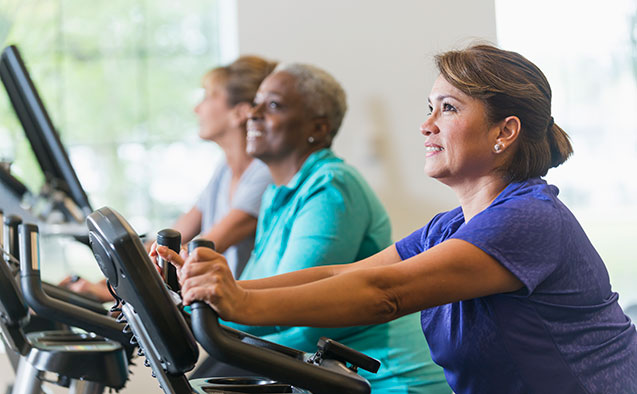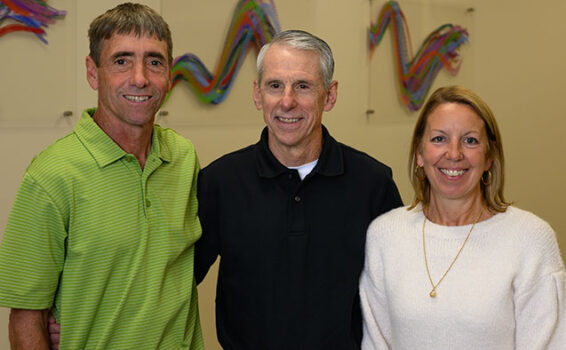Can weight loss and exercise help women stave off osteoarthritis?
WFU researchers receive $17.1 million to help women lose weight, avoid debilitating knee condition

In an extensive clinical study spanning two continents, Wake Forest University researchers will determine whether the most common treatments for osteoarthritis – weight loss and exercise – also help prevent women from developing the degenerative joint disease.
The University’s Department of Health and Exercise Science has received $17.1 million in funding from the National Institute of Arthritis and Musculoskeletal and Skin Diseases, the Arthritis Foundation, and the Centers for Disease Control and Prevention, among others. This initiative is aptly named The Osteoarthritis Prevention Study, or TOPS.
It is the first study to examine weight loss and exercise as preventatives for osteoarthritis.
Osteoarthritis is the most common type of arthritis, and the knee is the most often affected weight-bearing joint. Osteoarthritis occurs when the tissues in the joint become inflamed and the loads on the joint are excessive, resulting in degeneration of the cartilage and surrounding tissue. The result is pain, swelling and loss of motion. The condition is the leading cause of disability among adults and is the third most common diagnosis for inpatient hospital stays, at 1.25 million per year. It affects nearly twice as many women as men, often targeting the knees.

Messier
Professor Steve Messier of the Department of Health and Exercise Science, who will lead the five-year study as principal investigator (PI), has conducted more than 30 years of research into how diet and exercise can reduce pain and increase function in people who have developed osteoarthritis. As there is no cure for the condition, he has turned his attention to prevention – and whether proven treatments instead can be used to stop the disease from occurring.
Messier said this focus makes sense, given how he has seen weight loss and exercise reduce pain and increase mobility in people living with osteoarthritis. An earlier study led by Messier found that for every pound of weight you lose, you lose four pounds of stress on the knee.
“We know how to get people to lose weight, and we know that it's effective. But there is still no cure. It's the leading cause of disability in adults. We thought that maybe prevention is better treatment – that is, preventing people from actually getting the disease in the first place.” Professor Health and Exercise Science Steve Messier
Wake Forest University will serve as the coordinating center for four intervention sites: Brigham and Women’s Hospital in Boston, University of North Carolina at Chapel Hill, University of Sydney in Australia, and Wake Forest University.
At Wake Forest, Jovita Newman, project manager for TOPS, will oversee operations at the coordinating center. She has worked with Messier on several previous osteoarthritis studies and calls TOPS “the natural progression, having seen such successful results.”
TOPS is recruiting women aged 50 and older who have not been diagnosed with osteoarthritis. Participants must have a BMI of more than 30 and report no or infrequent knee pain. The commitment for each participant is four years.
The 1,230 participating women will be divided randomly into two groups:
- Diet and guided exercise: With a goal of each woman losing 10% of body weight in the first year, participants will adhere to a calorie-restricted diet with the option of using partial meal replacements and nutritious snacks from study partner Rapid Nutrition PLC. The exercise component includes 60-minute sessions of cardio and strength training two days per week on-site for 48 months.
- Healthy living: This group focuses on healthy lifestyle choices. Four one-hour, face-to-face group meetings per year will cover various health topics on nutrition, health & wellness, and chronic diseases. Participants in this group also will receive quarterly newsletters and text messages.
Using MRI scans, the researchers will evaluate degenerative changes in the knee at month 48 for all participants. They also will track knee pain, mobility in terms of how far each woman can walk in six minutes, and health-related quality of life.

Miller, Messier and Milhako
Professor Shannon Mihalko will serve as the Winston-Salem site PI as well as the TOPS coordinating behavioral psychologist, and Professor Gary Miller is the head nutritionist. Both teach in the Department of Health and Exercise Science.
“We’ve spent a lot of time focusing on treatment of osteoarthritis after diagnosis, trying to push off the trajectory of the disease,” Mihalko said. “Now, we will see if weight loss makes a difference in preventing the disease. That’s what makes this a very important study for women’s health.”
As an expert in behavioral psychology, Mihalko also hopes to measure how support during the weight loss journey helps keep the weight off at the end of four years and beyond.
That’s critical, given that many people who lose weight regain it and even surpass their original weight, she said. Weight loss maintenance will be the subject of subsequent research proposals from Mihalko.
She noted that there are very few successful studies that look at maintaining weight loss, a very important factor in long-term health. She called this an exciting opportunity.
“How do we help people maintain weight loss once they’ve reached their goal?” she asked. “Can we use strong social support and many other factors such as increased confidence to promote adherence to behaviors that lead to maintenance of weight loss?”
At Wake Forest University, the study team also will include Department of Health and Exercise Science staff members Monica Love, intervention coordinator; and Ryan Hill, testing and assessments coordinator.
Simon St Ledger, CEO of Rapid Nutrition, expressed his enthusiasm, stating, “We are delighted to be recognized by the study coordinators to support TOPS. Rapid Nutrition is committed to contributing to this pioneering research by supporting the study with our premium SystemLS meal replacement range, reinforcing our dedication to promoting women’s health and well-being.”
Additional TOPS sponsors and collaborators include the National Center for Complementary and Integrative Health (NCCIH), Office of Disease Prevention, Office of Research on Women’s Health (ORWH), Office of Behavioral and Social Sciences Research (OBSSR), and University of Missouri-Columbia.
Messier said finding a way to prevent osteoarthritis can greatly improve quality of life.
“By itself, knee osteoarthritis is not fatal,” Messier said. “But what happens is that people’s lives become narrower. If it hurts to go upstairs, you don’t go up to the second floor. If it is difficult to get in and out of a car. You don’t go for walks. You can’t play with the grandchildren. It changes your life.”
Recruitment for TOPS is now open. To apply to participate, call 336-713-8539, option 6, or visit https://www.tops-study.org/.
Previous osteoarthritis research by this Wake Forest research group spans more than 30 years and includes:
Categories: Top Stories
Wake Forest News
336.758.5237
media@wfu.edu
Meet the News Team
Headlines
Wake Forest in the News
Wake Forest regularly appears in media outlets around the world.




